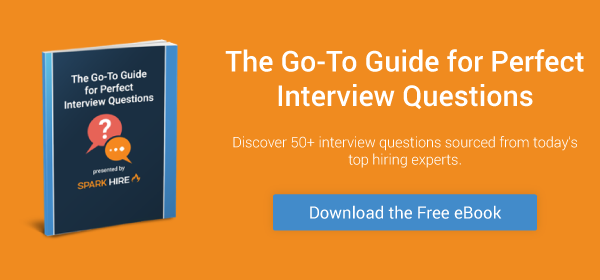Without a doubt, employees are a company’s greatest resource. If hiring professionals can’t find the right people for the team, the company will fail.
Unfortunately, many companies are having trouble landing candidates of a high caliber. In fact, our 2018 Growth Hiring Trends report found improving quality of hire was one of the top priorities for growing organizations.
To increase the odds of hiring the best person for the job, you must weed out candidates who aren’t dedicated or a good fit. Then you can spend more time getting to know serious applicants.
This is where virtual interviews come in. When used as an early candidate screen, virtual interviews reveal red flags about job seekers. But you have to know what types of answers are deal breakers.
Here are three responses that should make you rethink a candidate:
1. “I work better alone.”
Not everyone is a people person. But in every position, employees have to interact with other team members. Even for a remote job, a successful candidate has to communicate and problem-solve in the virtual work environment. If a job seeker isn’t at least open to working with others, it’s a big red flag.
Candidates who believe they are better on their own won’t immerse themselves in the culture. This means they won’t gain a true understanding of the organization or its values. Without this deeper connection to the company, the candidate won’t have the motivation to contribute to the team or remain engaged at your organization.
Candidates who think they work better alone also fail to understand the importance of feedback. Employees develop when their managers and peers share the strengths and weaknesses they see. When a person is constantly isolating themselves or working in a vacuum, they miss out on valuable learning opportunities.
2. “My last boss was terrible.”
Few candidates are so unprofessional they will flat out bad-mouth their former employer. But there are many variations on this answer that you need to look out for. Each one reveals something different about the candidate.
For example, your virtual interviews may ask candidates to describe their last position. It’s not a good sign if their response is more focused on their boss’s behavior than their own responsibilities. Aside from being unprofessional, it hints at a lack of self-awareness.
Also, pay close attention to the tone candidates use when talking about their former employers. A phrase like “he always challenged me” has a completely different meaning if the candidate is being sarcastic or critical. There’s no one sitting in front of candidates during virtual interviews, so their guard could be down in regards to their body language. Pay close attention to whether their expression matches the words they’re saying.
3. “I don’t know much about the company.”
The hiring process is a two-way street. It’s about the candidate learning about your company just as much as it is about you assessing them. It’s essential for both sides to decide if it’s a good fit. So if a candidate does not research your organization before a virtual interview, they aren’t very dedicated.
Chances are your virtual interviews don’t have a direct question that asks “what do you know about our company?” You look for more subtle signs that a candidate has done their due diligence. If a candidate is only using vague language when describing what they value in a job and workplace, they’re likely hiding their lack of knowledge about your company. They don’t want to unknowingly say something that doesn’t align with your organization.
Likewise, be cautious with candidates who repeat your mission statement word for word. Instead of thoroughly researching your company and processing what they learned in their own way, they memorized keywords from your career page.
—












